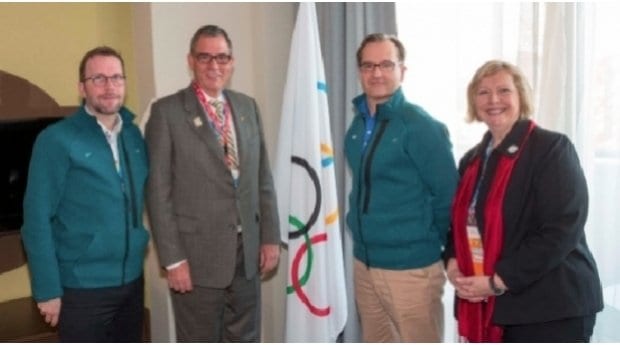Following news in September that the International Olympic Committee (IOC) would add anti-discrimination language to host-city contracts, its president has now indicated that Principle 6 of the Games charter will specifically include sexual orientation as a protected category in sport.
The existing language of Principle 6 now states that “any form of discrimination with regard to a country or a person on grounds of race, religion, politics, gender or otherwise is incompatible with belonging to the Olympic Movement.”
The proposal to add sexual orientation is among 40 recommendations that are part of the Olympic governing body’s Agenda 2020, to be discussed at the 127th IOC Session in Monaco, Dec 8 and 9. The goal of the sessions is to shape the future of the Olympics.
“I’m thrilled,” says newly reelected Vancouver Councillor Tim Stevenson, who was part of a delegation that met with the IOC in Sochi, Russia, in February to lobby for LGBT recognition in the IOC charter.
With the announcement of the proposed addition to Principle 6, Stevenson says IOC president Thomas Bach has kept his word about fostering change.
“Remember, I went in asking for changes to [Principle] 6, asking for Pride House, asking for host cities to sign a non-discrimination clause. Every single one of those they’ve now complied with,” he says. “I have a great deal of respect, obviously, for them. They’re good on their word and good for their word.”
Asked if he’s confident that the IOC can implement the change, Stevenson points out that all he has for guidance is what Bach is saying.
“He has tremendous moral persuasion as the president, unless the whole IOC revolts or something,” he says. “He’s done his homework, I would think, before he’s moved forward on this, so I’m as confident as I can be without knowing them intimately.”
French LGBT activist Marc Naimark remembers meeting Bach in November 2013, reportedly the first time the IOC met with LGBT sports groups.
“I was there as part of the Federation of Gay Games, and [Bach] was making positive noises, and people around him were trying to be reassuring about changes to come, so it’s very positive to see that those changes that were hinted at and hoped for have come to pass,” Naimark tells Xtra. Still, Naimark is reluctant to call the development a victory too soon, saying there are limits to what sports governing bodies, like the IOC and FIFA, have been willing to do at their events.
“You have events that more and more are taking place in repressive regimes, and so there is going to be an inherent conflict between the principle stated by the governing body and the legal reality on the ground,” he contends. “At the very best, there will be a little bubble of freedom at the event,” he says, pointing to the example of the Sochi Winter Games, where a designated free-speech area was “arranged out in the middle of nowhere, [and] you take a bus to go speak freely.”
Of greater importance is what happens outside of an event, Naimark says, noting that the IOC includes representatives from several countries where homosexuality is illegal and where athletes cannot come out. And he’s not certain what the IOC can do to ensure change in the national Olympic committees and their countries. The bigger factor is that for the daily lives of athletes, this change in the Olympic charter is not going to mean anything, he argues. For those countries, the addition of sexual orientation to Principle 6 is not even symbolic; they’re just going to ignore it, he says.
Naimark says it’s critical for the IOC to provide financing for the monitoring and implementation of changes. He’d also like to see human rights organizations help develop evaluation processes and have independent parties assess Olympic bidders and host cities.
“It takes money, thought and time to put those together, but you can come up with something workable,” he says. The bigger challenge is enforcement and how to tackle countries that have broken commitments, he adds.
Like Stevenson, Naimark believes Bach is sincere in his attempts to promote change but says that if there is a problem, it’s that the IOC and human rights organizations can say they have done their job.
“The organizations that have a serious commitment to equality in sport need to remain vigilant and take this as a positive step, but not lower their attention,” he says.
Stevenson acknowledges there are concerns but says the proposed change to Principle 6 is a big win to be celebrated.
He hopes that this is just one of the steps that will help bring about changes on the ground in those countries. It’s like the movement for gay marriage, he suggests, noting that the initial change in the definition of spouse in British Columbia’s legislation was greeted with some skepticism that it wasn’t yet full marriage. “No, it wasn’t gay marriage yet, but it was the next step in the groundwork” — and so is the proposed change to Principle 6, he asserts.


 Why you can trust Xtra
Why you can trust Xtra


